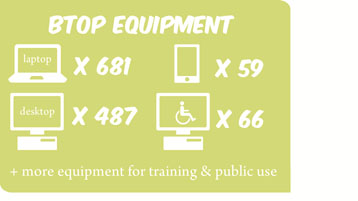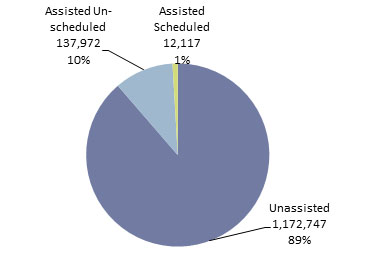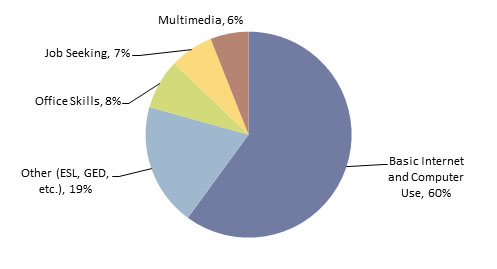In September 2010, the Colorado State Library (CSL) secured a $2.3 million Broadband Technology Opportunity Program (BTOP) grant through the U.S. Department of Commerce’s National Telecommunications and Information Administration and the American Recovery and Reinvestment Act. The CSL BTOP grant, totaling $3.3 million, includes $754,000 from the Bill & Melinda Gates Foundation and $316,234 worth of matching and in-kind donations from local libraries, CSL, and community organizations. This Fast Facts, which is the first in a three-part series about the CSL BTOP project’s first year,[note]The other Fast Facts in this series report on 2011 participant satisfaction with computer training classes [http://www.lrs.org/documents/fastfacts/312_computer_class_satisfaction.pdf]; and workforce efforts and partnership [http://www.lrs.org/documents/fastfacts/313_Workforce_Efforts_Partnership.pdf].[/note] summarizes the CSL BTOP project’s location, equipment, training, and usage data during its first year of implementation (March to December 2011).[note]Although the CSL BTOP project began in September 2010, data collection did not begin until March 2011. PCCs began purchasing and installing equipment in early 2011.[/note]
CSL BTOP Grant Goals:
- Increase public access to high speed broadband services in high-need/low-income communities
- Serve vulnerable populations (including the unemployed, underemployed, non-English speakers, seniors, and people with disabilities)
- Support job search and career advancement
- Increase digital literacy
- Enhance access to libraries and computers through ADA compliance
Locations
The CSL BTOP grant funded 50 grantees to build or enhance Public Computer Centers (PCCs) in 88 high-need urban and rural communities in Colorado with high poverty rates, ethnic diversity, low broadband penetration, and/or limited access to public computers. The PCCs are located primarily in public libraries, and in a museum, town hall, general store, and other spaces in communities without libraries. In 2011, 54 of the PCCs held launches to publicize their services and to give community members the opportunity to test out and receive training on the new desktop computers, laptops, iPads, and tablets.
 Equipment
Equipment
Over the course of the CSL BTOP grant, the planned equipment purchases will total 1,293 computer devices, including 681 laptops, 59 tablets, 487 desktops, 66 ADA compliant stations, and other equipment for training and public use. By the end of 2011, more than four-fifths of the PCCs (83%) had purchased and installed their equipment for public use. Each grantee used its own discretion on how to allocate funds based on community needs. For example, the John C. Fremont Library in Florence, which serves the rural areas of Coal Creek, Rockvale, and Williamsburg, offers classes at a senior center and kids clubs via a mobile laptop lab. Likewise, the Lamar Public Library partners with community groups and brings their mobile PCC lab to City of Lamar offices, the Chamber of Commerce, Rotary Club, and to outlying communities in rural areas of Prowers County. Another PCC, the Literacy Center at Delta County, purchased iPads for computer training and in-library checkout.
Training
The BTOP team at the Colorado State Library provides library staff with computer training and support to develop, market, and launch their PCCs. The BTOP team developed an extensive “Train the Technology Trainer” program for PCC staff and volunteers. In 2011, three full-time members of CSL’s BTOP team provided 470 hours of instruction (127 classes, workshops, webinars, and boot camps) to 2,883 technology trainers. The BTOP team received progressively higher ratings for these trainings over the course of 3 quarters (March to December 2011). More than 4 out of 5 participants (86%) rated the trainings overall as “excellent” or “above average” in Q2, and these ratings increased to 90% in Q3 and 92% in Q4. About 9 in 10 participants indicated that they would “definitely” or “probably” recommend the trainings to others in Q2 (89%) and Q3 (90%), and 94% did so in Q4.
In 2011, staff from 57 PCCs reported offering 1,364 computer training classes to community members (see Chart 1). These classes were attended by 8,625 participants over 2,744 hours of class. Close to two-thirds of the classes (60%) were about basic internet and computer use (email, internet searching). Classes also covered office skills (Microsoft Office, Quickbooks), job seeking (resume basics, job search strategies), multimedia (HTML, Photoshop), and “other” topics (ESL, GED, genealogy, language learning, grant seeking, benefits access, mobile device usage, etc.).
Chart 1
PCC Computer Training Classes, 2011
Open Access Usage
The PCCs also kept track of the use of computers during open access times. In 2011, they reported a total of 1.3 million of these types of uses (see Chart 2). Nine out of ten uses (89%) were unassisted, meaning that residents used the computers on their own. The remaining 11 percent included individual tutoring sessions in which users received assistance from PCC staff or volunteers. Of the assisted one-on-one sessions, most (92%) were unscheduled.
Chart 2
Computer Usage, 2011
Assisted and Unassisted

Conclusion
Sharon Morris, Director of Library Development and Innovation at the Colorado State Library and the BTOP Project Director, has described the PCC grants as a way for libraries “to re-invent the way they are serving their communities.”[note]Morris, S. (2011, February 3). Half Way Recognition. Colorado Public Computer Centers. Retrieved from http://coloradovirtuallibrary.org/btop/content/half-way-recognition[/note] The 2011 BTOP project data demonstrates that through their PCCs, Colorado libraries are providing computer access and training throughout the state, improving accessibility, and helping residents to more fully participate in and benefit from using the internet. By providing public computers with free and reliable broadband internet access in libraries and other community support centers, PCCs promote small business development, improve job skills, enable lifelong learning, and connect Coloradans of all ages with family, local, and global communities.[note]For more information about the CSL BTOP Project, visit http://coloradovirtuallibrary.org/btop/[/note]
